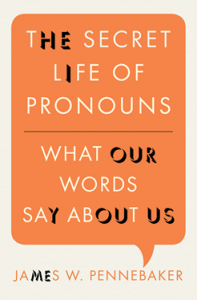A useful tool to compare sentences, paragraphs or whole texts. Just copy/pasted them and you’re done!
A useful tool to compare sentences, paragraphs or whole texts. Just copy/pasted them and you’re done!
 What the pronouns you use reveal about your thoughts and emotions, or how to liespot your everyday email.
What the pronouns you use reveal about your thoughts and emotions, or how to liespot your everyday email.
We’re social beings wired for communicating with one another, and as new modes and platforms of communication become available to us, so do new ways of understanding the complex patterns, motivations and psychosocial phenomena that underpin that communication. That’s exactly what social psychologist and language expert James W. Pennebaker explores in The Secret Life of Pronouns: What Our Words Say About Us — a fascinating look at what Pennebaker’s groundbreaking research in computational linguistics reveals about our emotions, our sense of self, and our perception of our belonging in society. Analyzing the subtle linguistic patterns in everything from Craigslist ads to college admission essays to political speeches to Lady Gaga lyrics, Pennebaker offers hard evidence for the insight that our most unmemorable words — pronouns, prepositions, prefixes — can be most telling of true sentiment and intention.
Study has far-reaching implications for unconscious role of infant experiences on adult development.
An infant’s mother tongue creates neural patterns that the unconscious brain retains years later even if the child totally stops using the language, (as can happen in cases of international adoption) according to a new joint study by scientists at the Montreal Neurological Institute and Hospital – The Neuro and McGill University’s Department of Psychology. The study offers the first neural evidence that traces of the “lost” language remain in the brain.
Facebook made it a standard option on the drop-down menu of relationship descriptors some ten years ago, allowing daters and would-be daters and whoever else might be interested to take note of such inherent drama in their friends’ profiles and, at the very least, to be warned before engaging or getting engaged. So even though Facebook didn’t create it’s complicated, it gets a lot of the credit for spurring its use across the world wide web and beyond.
Although there is a shortlist of strong contenders, as you’ll see below, it was vape that emerged victorious as Word of the Year.
So, what does vape mean? It originated as an abbreviation of vapour or vaporize. The OxfordDictionaries.com definition was added in August 2014: the verb means ‘to inhale and exhale the vapour produced by an electronic cigarette or similar device’, while both the device and the action can also be known as a vape. The associated noun vaping is also listed.
As e-cigarettes (or e-cigs) have become much more common, so vape has grown significantly in popularity. You are thirty times more likely to come across the word vapethan you were two years ago, and usage has more than doubled in the past year.
Usage of vape peaked in April 2014 – as the graph below indicates – around the time that the UK’s first ‘vape café’ (The Vape Lab in Shoreditch, London) opened its doors, and protests were held in response to New York City banning indoor vaping. In the same month, the issue of vaping was debated by The Washington Post, the BBC, and the British newspaper The Telegraph, amongst others.